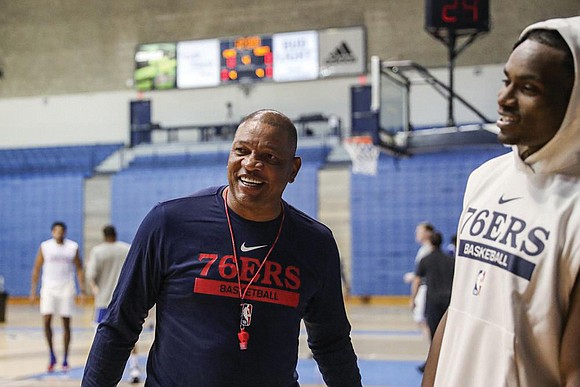76ers’ Doc Rivers merges Black history lessons into camp
Dan Gelston/The Associated Press | 10/13/2022, 6 p.m.

CHARLESTON, S.C. - Doc Rivers is at ease using his platform as an NBA coach to fight bigotry and racial injustice, campaign for politicians he believes in and advocate for social change on themes ranging from poverty to police brutality. Sometimes, his speeches sound like they were delivered by someone running for office. Might the 60-year-old Coach Rivers, the son of a Chicago police officer, someday stump for change as an actual politician?
“Oh God, no. I wouldn’t win, number one,” Coach Rivers said. “And number two, that’s not what I want to be.”
Coach Rivers is fine with wading into political waters — and the older he gets and the more he learns about modern issues and Black history with deep meaning to him, the more he speaks out. At Donald Trump. At police misconduct. At the horrors of racism that have shadowed him his entire life. At the idea that, even as coach of the Philadelphia 76ers, it can still be hard to find his place as a Black man in America.
“When you hear, ‘America first,’ that scares me, because I’m a Black man and that’s not including me,” Coach Rivers said recently in an interview with The Associated Press. “I want us to all be included. I want us all to function with each other.”
Coach Rivers has become an agent of change in the NBA and found his voice as an activist, trying to contribute perhaps more to the league than he has already, first as an All-Star guard and then with a coaching career that includes the 2008 championship with Boston and a spot this year on the list of the 15 Greatest Coaches in NBA History. That outreach starts at home — or perhaps, on this point, on the road — where Coach Rivers used training camp not just as the usual time to rehash X’s and O’s but as a daily history class. The Sixers practiced at The Citadel, the military college where tanks and jets and plaques dedicated to prisoners of wars dot the campus, an education all part of Coach Rivers’ plan to squeeze more out of camp than basketball.
“All of it is good for us,” Coach Rivers said.
The Sixers usually hold camp at their New Jersey complex but Coach Rivers wanted to strengthen team bonding with a road trip. The Sixers gathered two weeks ago for team dinners, played cards and video games, and had serious conversations, the type of day-to-day activities largely shelved the last two seasons because of COVID-19 protocols.
“When you have camp at home, you don’t get that,” Coach Rivers said. “They go home at the end of practice and they don’t spend time with each other.”
Coach Rivers was a guard with the Knicks in the early 1990s when the team held camp at the College of Charleston. Back then, Coach Pat Riley made the players walk from the team hotel to the arena.
The 76ers stuck to the team bus.
Coach Rivers and the Sixers organized field trips to the Old Slave Mart Museum, often staffed by individuals who trace their history to the enslaved people of Charleston, and to the Avery Institute of Afro-American History and Culture. Citadel President Gen. Glenn Walters and retired professor and historian Bernard Powers both spoke to the team.
“My people, my African people coming here, the people that gave up their lives for us to be able to be in this position, it was good to learn about all of that,” said center Joel Embiid, who was born in Cameroon and recently became a U.S. citizen.
Mr. Powers said by phone that he talked to the Sixers at their team hotel about such topics as the role Charleston
played in the trans-Atlantic slave trade, the slave revolt of 1739 and the descendants of enslaved people known as Gullah, who live in small island communities scattered over 425 miles of the Southern Atlantic U.S. coast.
“This was the port where a greatly disproportionate number of Africans were brought here,” Mr. Powers said. “This place, more than any other, might be very likely a source of their ancestry.”
Coach Rivers believed the experiences resonated with a team full of 20-somethings all the way up to coaching staff veterans.
“Teaching American history is under assault right now. And it’s not Black history or teaching about slavery, it’s American history,” Coach Rivers said. “And so I was amazed. The first thing that I was taught the other day was, how many players, and not only players, coaches, came up to me and said, ‘Wow, I never was taught that in my history class.’”






